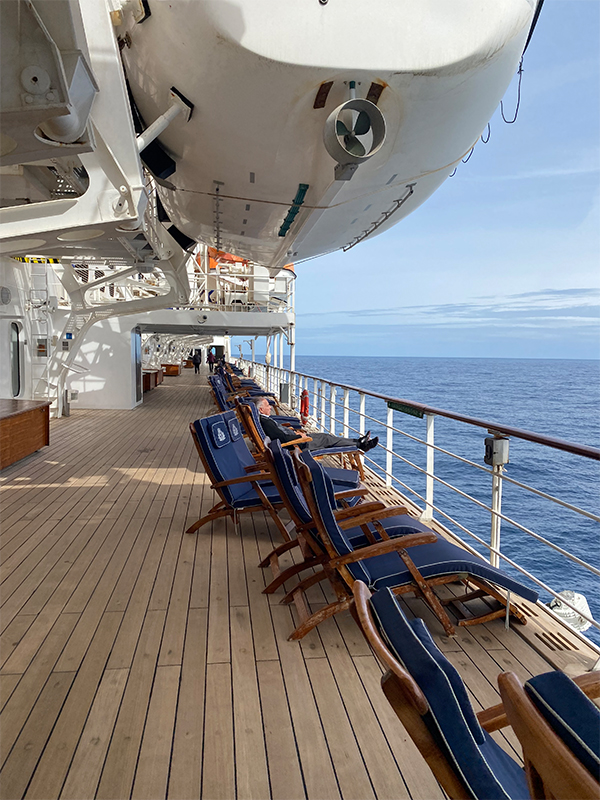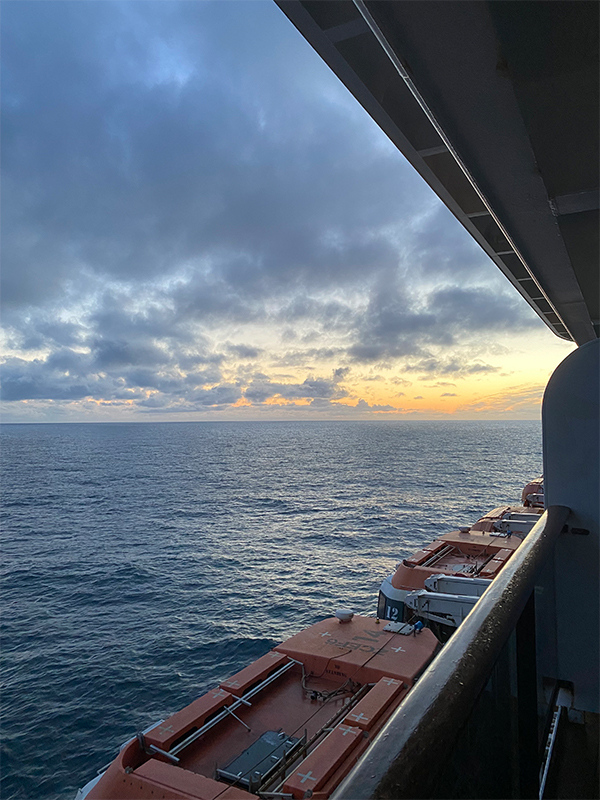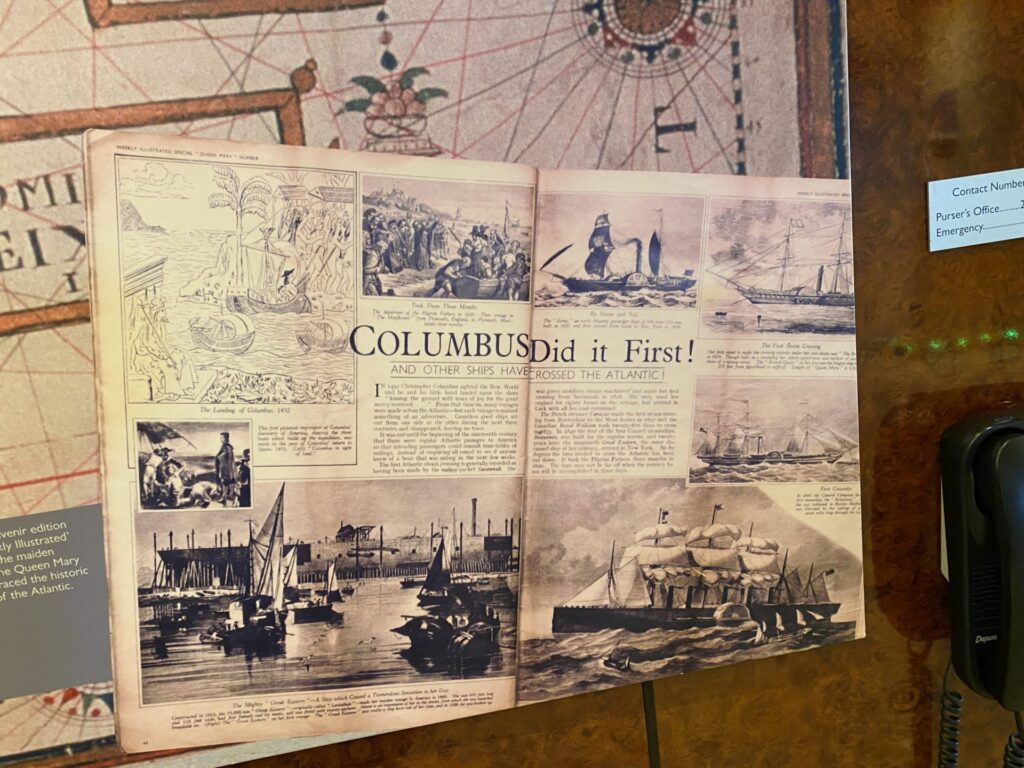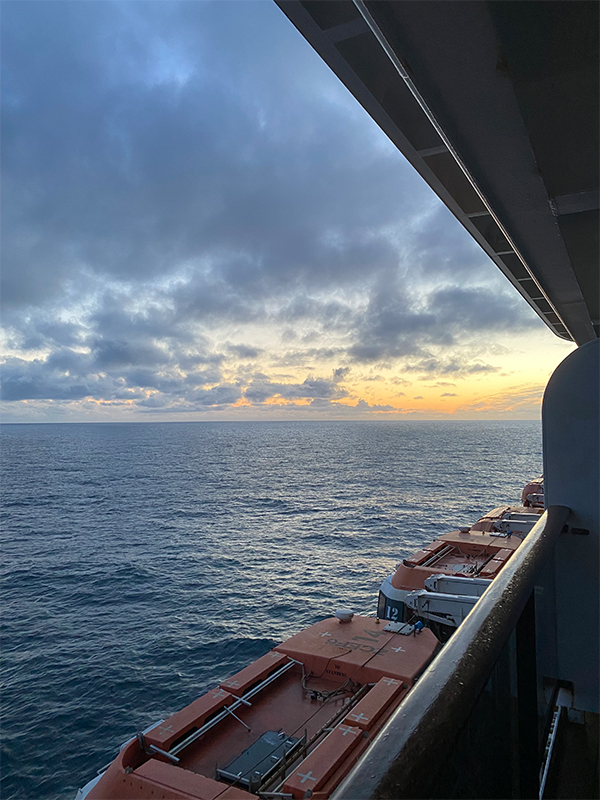“Every body of water, even a puddle, tells a story,” a man at my dinner table proclaimed. I was in the Princess Grille on Cunard’s Queen Mary II, making my second journey across the Atlantic Ocean that month, returning to America after three weeks of traveling in Europe.
Everyone at the table then shared the stories these waters told them: tales of love, adventure, science. I was quiet, picking at a bit of potato on my plate. These were wealthy white people in their 70s and 80s. While the conversation had been pleasant so far, my dining companions probably didn’t want to know the story this ocean told me, a story that had prompted an image of expectant ghosts. But when the time came to answer the question, I was too tired to lie.
“What story do you see when you look at the ocean?” the man’s wife asked me in her warm British accent, gesturing at the waves out the window.
I answered her, honestly and vaguely. “I think of dark things,” I replied.


On my first crossing four weeks prior, headed from New York to England, the act of existence became difficult in the middle of the Atlantic. Some meridian had been crossed; I sank. I heard every sound as though there were rivers in my ears; I felt every touch press into me until it seemed I might burst, oceans of blood and water spilling out of me onto the ship deck. The well pump in my spine choked me to an eerie rhythm.
To some, the idea of a trans-Atlantic luxury cruise might be exactly how it sounds—a high-quality travel experience on the water. The journey is supposed to be one of rest and relaxation—and for the white passengers, I think it is. Someone blissfully said he loved “floating around.”
For me, it was anything but relaxing. I was “floating” around one of the most infamous, populous graveyards. A site of mass genocide that changed the shape of our world forever. Although my ancestors—kidnapped from Western Africa as part of the trans-Atlantic Slave Trade—were resting further south than I now sailed, their voices carried with the current. Here, the dead wouldn’t let me rest.
When I first felt the strange sensations, I wondered if perhaps I’d brought it on myself. I’d boarded the ship thinking of slavery, so had I invited these spirits? Was it psychosomatic? Was I wallowing in self-pity and shallow identity politics? Had I hit the melatonin gummies a little too hard? But I’d never felt so completely myself, and that’s how I knew it was real. For a split second, I was confronted with the totality of who I was and all I’d ever been, and it frightened me.
Above me, there were more stars than I’d ever seen in my life. I sobbed, which feels melodramatic to retell, but it was physically impossible to stop, an impulse as inevitable as breathing. I was thinking of my ancestors who likely only saw these stars when they were being thrown overboard, or brought out from below for a British sailor’s violent pleasure, or when they decided to jump into the abyss rather than await the torture on the other side of this triangle I was now sailing across.
Every morning on the first crossing, the captain cheerily reminded us that we were continuing along “our great triangle.” Perhaps it means something different to the white people on this ship, something glamorous or cinematic. But to me and other students of the Atlantic World, it refers to triangular trade, meaning the paths ships took across the Atlantic. They carried weapons from Europe to Africa, gold and ivory from Africa to Europe, enslaved people from Africa to the Americas, and cotton, salt and sugar—the product of forced labor from the enslaved—from the Americas to Europe.

The truth is, I didn’t feel like I belonged here, and it wasn’t just the ocean’s blood-soaked history triggering that feeling. One man gave me an evil, hostile stare every night at dinner. If his food distracted him from his harassment of me, he’d glower at the plate as if it had betrayed him, resuming his intimidation as quickly as possible, bits of milk-poached haddock dripping from his mouth. A few people shoved and yelled at me during the embarkation process in New York, assuming I didn’t qualify for priority boarding. I was asked if I was a massage therapist or Caribbean performer working for the ship. (“You’re such a pretty girl, you must be a performer.”)
When I spoke to the only other three Black passengers I saw onboard during the first crossing, they spoke of similar experiences. Many of the staff I spoke with—from Caribbean, African, South, and Southeast Asian countries—either alluded to or directly told me that they had experienced a noxious combination of racism and classism from some other passengers. One Black staff member told me, “They used to have us as slaves, and they want us as slaves again. On this ship, they get to pretend it is so.”
Black people have always been on these ships, however sparse in numbers. Ethelene Whitmire’s research shows how countless Black people of all economic stations took the crossing on Cunard and White Star Line before planes were invented or common, though their journeys were difficult and marked with racism at every turn, sometimes rife with the threat of death. In 1845, the former slave and abolitionist Frederick Douglass crossed the Atlantic on Cunard’s Cambria and was almost thrown overboard by fellow passengers. Among the Black star passengers and performers Cunard boasts of on the QM2’s onboard museum, there is Pearl Bailey, Duke Ellington and Ella Fitzgerald. They do not mention Frederick Douglass.
Even today, crossing the Atlantic by ship is not a journey many Black people make. This is especially true for younger Black people. The experience is actively hostile to the very concept of youth. Bridge, bingo and flower arranging are among the most popular activities. The food is belligerently unsalted.
Although I don’t fly because of my fear, the ocean crossing brought another kind of discomfort. If it is the loss of identity I fear on planes, it is the overwhelming awareness of my identity that intrigued and tormented me on the ship. Due to heart problems, the late Martinician writer and philosopher, Édouard Glissant, stopped taking long-distance flights and started taking the crossing. In 2009, on the Queen Mary II, Glissant spoke with Malian writer and filmmaker Manthia Diawara of his reflections.
“On [a] boat you can be closer to yourself, while in a plane you’re really detached from yourself,” Glissant said, adding that on the ship, one could not run away from oneself or from time.
Consider the triangle. Its swirling center is my origin point, where every drop of my veins leads to, where all the trade routes and labor and death and betrayal and love that made me come to meet.
I told one of my dinner companions that the sea felt like home, despite its darkness. It is my home. It’s hallowed ground—a site of burial and mass genocide. It’s the place where nations were shattered, then a new nation, and then several, sprang out of its waters. This triangle is where I begin.







